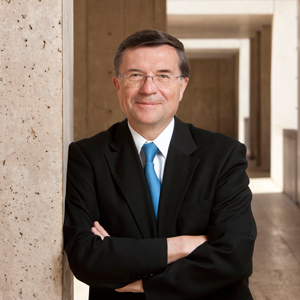
October 15, 2015
LA JOLLA–The Society for Neuroscience (SfN), an organization of nearly 40,000 scientists and clinicians, will award the Swartz Prize for Theoretical and Computational Neuroscience to Terrence Sejnowski, Salk professor and head of the Computational Neurobiology Laboratory.

Terrence Sejnowski, head of Salk’s Computational Neurobiology Laboratory
Click here for a high-resolution image.
Image: Courtesy of the Salk Institute for Biological Studies
The $25,000 prize, supported by The Swartz Foundation, recognizes an individual who has produced a significant cumulative contribution to theoretical models or computational methods in neuroscience. The award will be presented during Neuroscience 2015, SfN’s annual meeting and the world’s largest source of emerging news about brain science and health.
“Dr. Sejnowski is deserving of this prize for his role in founding and growing the field of computational neuroscience, his commitment to training and mentoring young scientists, and his many major research discoveries,” says SfN President Steven Hyman. “It is an honor to recognize his tireless efforts to understand the computational resources of the brain and to computationally model how brain activity becomes behavior.”
Sejnowski has demonstrated significant breadth in his research career. He has developed artificial neural network models as well as learning models for birdsong and neuroeconomics. He helped develop the algorithm for independent component analysis, a method now widely used in many fields.
Most recently, he demonstrated how the loss of a critical receptor in a special class of inhibitory neurons in the brain may be responsible for neurodevelopmental disorders including autism and schizophrenia. He also showed how little known supportive cells in the brain called astrocytes may be responsible for controlling patterns of brain waves (gamma oscillations).
“This is a great honor to have SfN bestow a prize named for Jerome Swartz, who did so much for the field of computational neuroscience by supporting centers at Salk and other major research universities,” says Sejnowski.
In addition to his efforts to bring attention and funding to the field of computational neuroscience through organizing conferences and consulting for numerous agencies and panels, Sejnowski always found time to run experiments in his lab. These ranged from investigating the pacemaker neurons of electric fish, to modeling the changes that occur in the hippocampus during learning, to understanding how sensory information is represented in the cerebral cortex.
Sejnowski earned his PhD at Princeton University and taught at Johns Hopkins University before joining the faculty at the University of California, San Diego, and the Salk Institute. He was named a Howard Hughes Medical Institute investigator and now holds the Francis Crick Chair at the Salk Institute.
Office of Communications
Tel: (858) 453-4100
press@salk.edu
Unlocking the secrets of life itself is the driving force behind the Salk Institute. Our team of world-class, award-winning scientists pushes the boundaries of knowledge in areas such as neuroscience, cancer research, aging, immunobiology, plant biology, computational biology and more. Founded by Jonas Salk, developer of the first safe and effective polio vaccine, the Institute is an independent, nonprofit research organization and architectural landmark: small by choice, intimate by nature, and fearless in the face of any challenge.